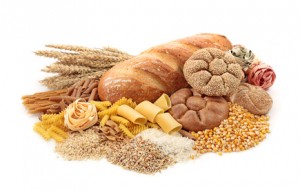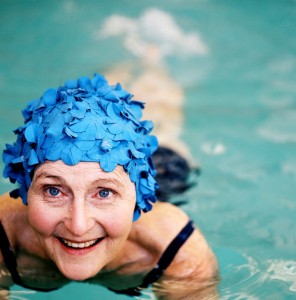This week, read about resources for masters athletes, avoiding gluten without reason, boring TV shows and food consumption, why exercise is the best medicine, and more.
Resources for Masters Athletes
 Exercise is critical to healthy aging, and competing in sport is a great way for all ages to keep motivated and stay fit. Once you’re over age 35, should you be changing things to get the most out of your exercise routine? What about if you’re 60 or 70 and still want to be at your best? You certainly aren’t alone, and there are some excellent resources available. Be sure to check out July’s Sport Information Resource (SIRC) Newsletter, which is devoted to articles that deal with many aspects of being a masters athlete.
Exercise is critical to healthy aging, and competing in sport is a great way for all ages to keep motivated and stay fit. Once you’re over age 35, should you be changing things to get the most out of your exercise routine? What about if you’re 60 or 70 and still want to be at your best? You certainly aren’t alone, and there are some excellent resources available. Be sure to check out July’s Sport Information Resource (SIRC) Newsletter, which is devoted to articles that deal with many aspects of being a masters athlete.
Also, be sure to check out my newly updated page devoted to Masters Athletes. Whether you’re a coach, masters athlete, or someone any number of years over age 35 who’s thinking of becoming active, there is plenty of information and inspiration here.
Are Athletes (& Others) Avoiding Gluten Without Good Reason?
 The gluten-free trend is a popular one, and many athletes have hopped on the bandwagon thinking it might improve their health, digestion, and athletic performance. People with celiac disease (about 1% of the population) need to absolutely avoid gluten because it damages their intestines; others believe they are “gluten sensitive,” which is a debatable condition that recent studies have called into question. A new study reported in Runners World reveals that about 40% of of athletes without celiac disease have diagnosed themselves as “gluten sensitive” and try to follow a gluten-free diet. Although many people report feeling better without gluten, evidence shows this is likely the result of people paying more attention to their overall diet, a strong placebo effect, or choosing healthier options (for example, eating an orange instead of a bagel provides many more nutrients and fewer calories – a healthful substitution for many, but that doesn’t mean you need to avoid bagels altogether . . . ).
The gluten-free trend is a popular one, and many athletes have hopped on the bandwagon thinking it might improve their health, digestion, and athletic performance. People with celiac disease (about 1% of the population) need to absolutely avoid gluten because it damages their intestines; others believe they are “gluten sensitive,” which is a debatable condition that recent studies have called into question. A new study reported in Runners World reveals that about 40% of of athletes without celiac disease have diagnosed themselves as “gluten sensitive” and try to follow a gluten-free diet. Although many people report feeling better without gluten, evidence shows this is likely the result of people paying more attention to their overall diet, a strong placebo effect, or choosing healthier options (for example, eating an orange instead of a bagel provides many more nutrients and fewer calories – a healthful substitution for many, but that doesn’t mean you need to avoid bagels altogether . . . ).
Are you avoiding gluten because of gastrointestinal concerns? It’s important to recognize that GI issues can be very complex. Consider my advice on what to eat before working out, and consult this recent review with recommendations for gastrointestinal complaints during exercise. There is little evidence that avoiding gluten or wheat will improve your health. In fact, whole grains have many health benefits and gluten-containing grains are an integral component of some of the best-studied and healthiest diets in the World.
More reading about gluten-free diets and health:
- Experts Question Benefits of Gluten-Free for All but a Small Minority (Wall Street Journal)
- Gluten elimination diets: Facts for patients on this food fad (Kathleen Cadenhead, MD, Margo Sweeny, MD, BC Medical Journal)
- Dissecting the Myth: Why Grains and Gluten Aren’t Bad for You
- When a gluten-free diet is *bad* for you (Berkeley Wellness)
- Is gluten-free healthier? (Jill Parnell, PHD)
- The dangers of going gluten free
- Gluten-free diets: who’s spreading the bulldust? (Bill Shrapnel, MHP)
- The facts about gluten and gluten intolerance. (Science-Based Medicine)
- McGill’s Joe Scwarcz reviews Wheat Belly (Joe Schwartz, PhD)
- Is wheat bad for you? Not for most people. (Marion Nestle, MPH, PhD, Food Politics Blog)
- Ignore Grain Brain & Wheat Belly: Eat WHOLE Grains (Dr. Gabe Mirkin)
- Beating on Wheat and Raining on Grains (Dr. David L. Katz)
- Is modern wheat making us sick? (Monica Reinagle, RD)
- Evidence-based review of the popular diet book Wheat Belly (Julie Jones, PhD)
- Does wheat make us fat and sick? (European Food Information Council)
Boring TV Shows Make You Eat 50% More
 Many of us eat for reasons other than hunger. Grazing mindlessly on food while watching TV is a common phenomena that increases the daily caloric intake of many people, and researchers from Sweden’s Uppsala University wanted to learn more about this behavior. They tracked the snacking of women watching “engaging” vs “boring” TV shows, and found that women who watched the boring TV shows ate a lot more (52%) than women watching an engaging comedy show. Other research has also shown that boredom motivates food intake. (PLOS One July 1, 2014)
Many of us eat for reasons other than hunger. Grazing mindlessly on food while watching TV is a common phenomena that increases the daily caloric intake of many people, and researchers from Sweden’s Uppsala University wanted to learn more about this behavior. They tracked the snacking of women watching “engaging” vs “boring” TV shows, and found that women who watched the boring TV shows ate a lot more (52%) than women watching an engaging comedy show. Other research has also shown that boredom motivates food intake. (PLOS One July 1, 2014)
You may not have control over boring activities, but you can control what you eat: if you don’t need the excess calories, your best option is to have healthy low-calorie snacks on hand. See my article What is Controlling Your Eating for more insight into how cues not related to hunger influence what we eat, and how we can turn this into a health advantage.
 Exercise Is the
Exercise Is the
Best Medicine
Physical activity is one of the most cost-effective and promising strategies for healthy aging, with good evidence showing that exercise helps keep your brain sharp, increase quality of life, and prevent premature death. Australian researchers reviewed the published literature from 2009-2013 that investigated exercise in postmenopausal women to see how it influenced their health: they found overwhelming evidence that being active was linked to lower rates of cognitive and physical decline typically associated with aging. Exercise programs that included higher intensity exercise showed the best improvements for fitness and had the greatest impact on health. The authors recommend that physicians should prescribe physical activity to women, and consider encouraging higher intensity exercise and activities that women can easily incorporate into everyday activities. (Anderson et al. Maturitas, June 2014).
Other Links of Interest This Week:
- Food Influences Your Body’s Internal Clock->insulin may play role in circadian rhythms http://goo.gl/R4BRBS
- Report advises banning antibacterials triclosan & triclocarban because of environmental impact: little benefit and products draining trouble into Great Lakes http://goo.gl/xZxivE
- Antioxidant supplements (vit C & E) prevent health-promoting effects of exercise http://goo.gl/iQfW6v
- Another reason to take the stairs-> study shows hospital elevator button is germ hotspot http://goo.gl/56d1ui
- The kids are not alright: @GretchenReynold on the falling fitness levels & heart health in most kids http://goo.gl/8H3HfP
- What do Tour de France cyclists have for breakfast? Dietary tactics of Team Sky http://goo.gl/wjBx7S
- Watch comedians take on the anti-science crowd: can humor make a difference? http://goo.gl/ktwp2m
- Athletes need to relax to go faster @drgregwells shows athletes how with Adam Van Koeverden example http://goo.gl/xBhWi6
- Seeds are nutrition powerhouses! Here’s the lowdown on chia hemp flax sesame pumpkin & nigella seeds http://goo.gl/QfBrtY
- Athletes: Why tapering can be a dangerous thing! Good read/great info by @stevemagnesshttp://goo.gl/5dq8rw
- Where are female athletes on TV? women=40% of sport participants & get 4% of media coverage http://goo.gl/XEaHVQ
- Yogurt linked to lower weight, esp in high fruit consumers http://goo.gl/cJxHQD
- Most elite athlete don’t get enough sleep: individual sport athletes worse than team
- Want to improve your running economy? Stop stretching.